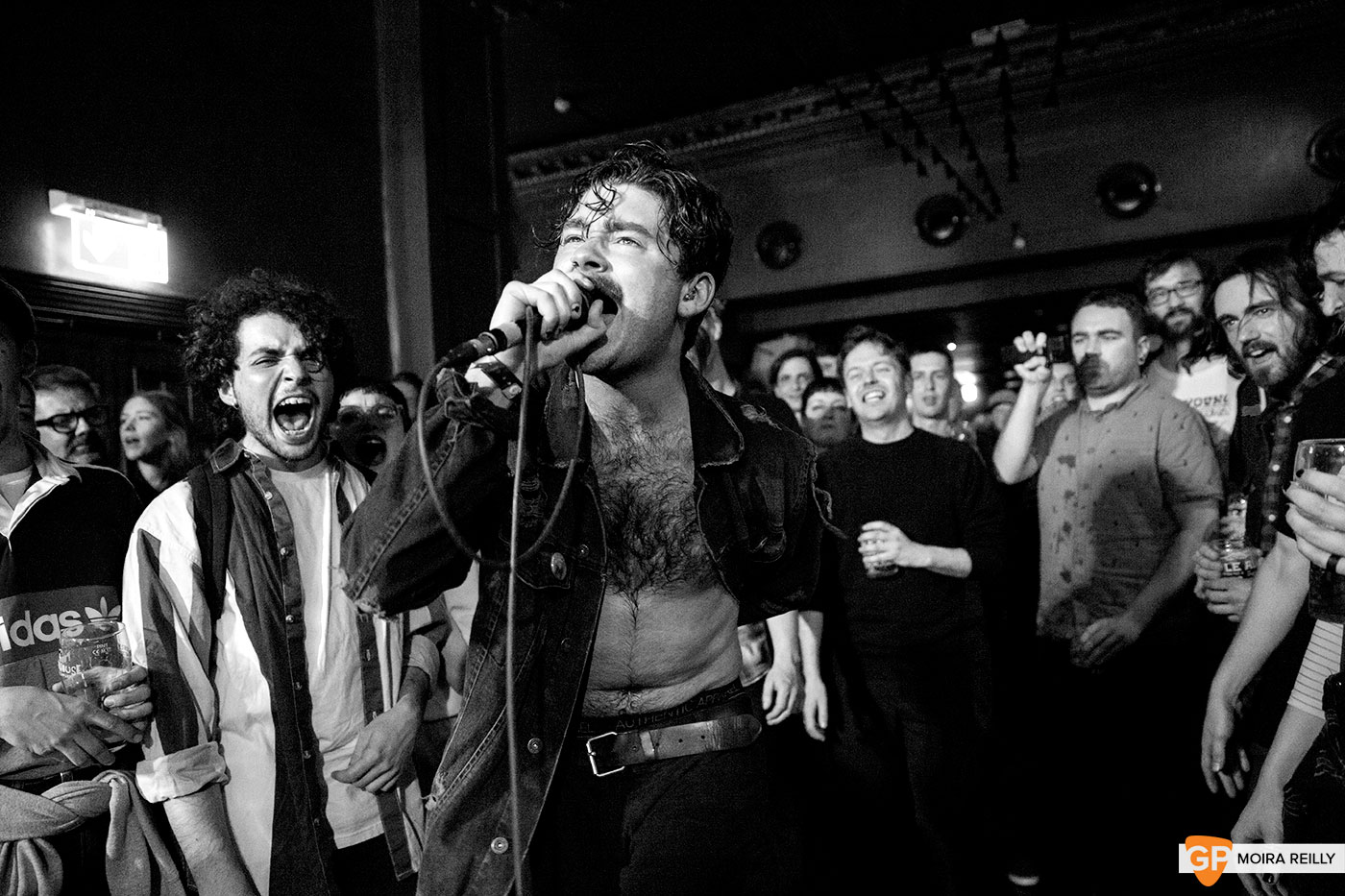What have you got against Topher Grace? We ask Thumper frontman Oisín Furlong the question over the phone, enquiring about the inspiration behind the title of their raucous new single that bares the name of the That ‘70s Show star.
“There's two answers to this question: the first one being that, in general, the song deals with sort of being an actor, of not being your true self or airing a different version of yourself in the outside world than you do at home,” explains Oisín, before noting, “and obviously Topher Grace is an actor and maybe a forgettable one. I don't know, I've seen some good movies with him in them, but the second one honestly is just that. You know that tune Clint Eastwood by Gorillaz? Obviously, they used a famous actor's name, I just thought it'd be really funny to name a song after a B-list celebrity with the same reverence.”
Topher Grace is a pulsating look at the pluses and pitfalls of living a hedonistic existence. "There are some other lyrics I could've pulled from that song for the title, but I don't think any of them would've painted us in a particularly good light, so let the song do the talking you know.”

THUMPER - The Workmans Club - Hard Working Class Heroes Festival - 28th Sept 2018
Furlong notes that we’re not the first people to be quizzical of the song’s title. “We went in for a meeting with management and one of the guys said: ‘So what have you got against Topher Grace?’ And I was like: ‘What are you talking about?' and they said: ‘Well, why did you name your song after him?’ I'd actually completely forgotten. The title had been there for so long that I'd forgotten it was even a person, it was just ubiquitous with the tune.”
“Hopefully, we don't get any lawsuits,” says Furlong, before trailing off as he spots a guitar being delivered to one of his neighbours. “If he likes the song then he'll probably be happy enough.”
Beyond the jokey reference to the actor and a show of respect to the genius of Damon Albarn, Topher Grace examines the hedonistic nature of Dublin’s houseparty scene, though Oisín is quick to note that he is “not slagging off the party lifestyle.”
“It is more inward facing,” he declares thoughtfully. “In this song the people I'm with are living their own lives. It is more of an internal monologue. Even though the places where this song are set are inherently social, it's more about how you find yourself slipping in and out of touching on home truths that you mightn't admit in a more clear state of mind, but how all this is lost in the milieu of all the other bullshit that's coming out of your mouth.
"The character in this song isn't pointing their finger outwards at anybody else. It's bred from within, apart from the end of the song where I try and tie it up on a personal level. I'm definitely not trying to prescribe any answers. It's written in the voice of someone who is out of their mind, so it's purposefully swinging like a pendulum between what you really mean or what you're trying to discover about yourself and this kind of macho, braggadocio tone that you can find yourself striking.”
To help Thumper capture the pendulum of braggadocio perfectly in sound they enlisted the help of modern Irish music legend, Rhian Trench, and his partner, Scan, and decamped to their studio, The Meadows, in Wicklow.
“Those two guys have dubbed themselves the Deaf Brothers because they're in there seven days a week making really loud and strange music…we've similar tastes and they've so much beautiful gear down there, so it really did get pretty weird in there.”
Furlong describes the sessions as being “pretty spontaneous” with the results exceeding their expectations. “We went down to record one or two songs and ended up recording the large bulk of what will be the album in the end.”
Thumper have enlisted the help of Phil Magee to mix the album in order to “bridge the gap between how gnarly the recordings are and something a little more palatable to people beyond our band.”
Bringing in Magee, who is well known for his work with Kodaline and Gavin James, may seem like an unusual course of action for a noise rock act, but for Thumper and Oisín it makes perfect sense.
“Somebody with different sensibilities will hear something that you don't hear and highlight bits that you wouldn't think were that important but ended up bringing it all together.” Oisín also notes that now the band is a six-piece, “you have to have somebody who knows what they are doing so it doesn't sound like a complete mess.”

One noticeable difference in approach from previous Thumper releases is the placement of Oisín’s vocal, which has traditionally had a 'buried in the next room' vibe rather than the traditional front and centre placement you’d normally associate with pop music.
“In the past I've buried them (vocals) from being self-conscious, but with a song like this, and the songs we're writing, I just don't see any point in it anymore. I have to face it. With this song you're striving for self-awareness and it would be a little hypocritical of me to make a mix that didn't serve the song.”
Furlong also feels that due to the new style of songwriting, they needed the buffer of Magee to stop them from deviating back to their tried and tested methods.
“I think we needed to have somebody else (involved). I probably would've buried those vocals way, way down because I'm very self-conscious. It's like hearing your voice on an answering machine for seven minutes. I think the song is trial by fire in terms of being self-conscious of your own voice, but coming out the other end I think it's the song I'm most proud of so far. We pushed ourselves in loads of different directions that felt uncomfortable, or were uncharted terrain, but ultimately ended up with something I think we're all very happy to stand by.”
Another element that was vital in achieving the pendulum of braggadocio effect was recording the track live, without a click, with Thumper’s two drummers facing each other and the other four members placed in two semicircles in the room.
Furlong notes that while the two drummers are not doing massively different things in terms of their parts, it creates a feel which he describes as “hearing the eye-contact coming through the speakers.”
“This song is pretty rhythm-based, but even though it's pretty monotonous it's the little differences in the dynamics and tempo shifts.”
Furlong notes that the double drummer thing creates more interest outside of the band than it does within. “We don't overthink it. It's conversational, they play off of each other in an interesting way in the same way that two guitarists would play around the vocal. They do the exact same thing with the drums.”
Furlong describes the results of not playing to a click as creating “a living organism” when Thumper play together. “There's this ebb and flow and natural conversation in terms of what the dynamics are and the tempo.
“It took a long time to nail this song because everything is played off the vocal and the sentiment of the words. There's actually very few musical elements in the song. A lot of it is just repeated, repeated, repeated, but what's changing is the intensity as it goes along. I made a demo of this song and it just had no life because it was a looped drumkit, a looped riff and me just sort of bleating over the top of it. It really came alive when you put some bodies in a room playing it in a sort of Krautrock sort of a way.”
Apart from Oisín’s personal struggles with his vocal inhibitions, the band also faced several obstacles to achieve what they wanted.
“The challenge is we're stripping away lots of the elements that would have defined us - melodic elements, the loud-quiet-loud Sonic Youth/Nirvana thing. It's still there, to an extent, but it's more linear. The challenge was what can we take away? What can we add? Will it still sound like us? And how do we do that?"

"It felt good to come out the other end having reached for these different things we had never reached for before and for it still to be a Thumper song.” Furlong is especially grateful for this in relation to Topher Grace, “because it's not a song that you learn your part and that's the way it goes. We had to learn it in public so we've been playing it at every gig for a year.”
Weighing in at a hefty six and a half minutes, Topher Grace is not for the faint-hearted. “The radio edit is the alternative version,” he says laughing. “I think it's gotten even longer and longer and weirder and weirder over the course of our last tour.”
Streaming culture has challenged the cultural significance of albums thanks to the shuffle button (Philistines), but it has also left young bands with a new conundrum to face, i.e., what material to include and leave out as it is all housed in the one place anyway. For Thumper’s part, they have opted to not include material from their 2019 EP, 'Out Of Body Auto Message'.
“Anything that we did with Dan (Fox, of Girlband) we felt was its own body of work and stood alone. It was a nice summation of where we were at that time. Obviously, the temptation was there to bring some of those songs across because it's our first album and make a sort of 'best of Thumper 2000-and-whatever to 2020' but ultimately, we felt that would be disingenuous. So, we wrote this album as a whole thing. Topher (Grace), Ad Nauseum, and the other tunes that are coming are all part of that, but there will potentially be some even older songs than the ones we did with Dan on it.”
Like all bands, Thumper have lost out on many opportunities in 2020. However, Oisín has a pragmatic approach to the lockdown period.
“I suppose the way we have to look at it is that it's good from a creative point of view, making this album the best album it can be and making these songs that we are releasing as considered and as close to our vision as we can."
"The alternative way to look at it is that we've been building up to this summer for many years and we've had a lot of festivals and touring pulled out from under us. Hopefully we're not going to be losing too much momentum, but as always, the main thing we are striving for is the song-writing. If we keep sight of that we won't get too down on ourselves because the shows will be memories, eventually, but the songs will live on.”
Oisín is also conscious of the fact that Thumper are a white band releasing music in the age of Black Lives Matter and is keen to throw his weight behind the movement whilst acknowledging that he wasn’t as informed as he should’ve been on the subject.
“We're going into the single release cycle and we're talking about our music and our touring and our lives and it definitely puts it all into perspective when such horrible things are happening across the world to people of colour and minorities. Whatever about being in a band, I definitely feel a responsibility, as a white man, to educate myself in ways that I wasn't educating myself before. As much as the black tiles on Instagram showed solidarity, the bigger conversation that needs to be happening is one of informing ourselves. That's the first step to a better world for everyone - everyone being educated and not just sticking their head in the sand because you don't see things being your fight. Will this change what Thumper is? I hope so. I hope it changes us all as people and that will inevitably change our creative output. What that looks like remains to be seen, but I hope that none of us are the same after all of this.”

"I suppose the worry is that you slip back into passive support and feeling that it's somebody else's conversation to be had. For a long time, I was definitely letting that conversation be had by other people, and conflating that with me being supportive. In actual fact, I think it's my duty as a person in this world to engage, and part of engaging is purely listening, obviously, but no matter how uncomfortable I feel or if I feel out of my depth it is the responsibility of everybody, no matter what colour or creed, to weigh in on this and be as informed and understanding as humanly possible.
"It's okay to not know what the right thing to do is, but as long as you're listening and you're thinking about it, and you intend to discover what that right thing is or you're as active as much of a way as you can be...anything is better than just being passive. I think and I hope that none of us will go back to being like that.”
Oisín has also been releasing music under the moniker Alamore Drive, something which he plans to continue doing as an outlet for his songwriting
“I've been in the studio during lockdown finishing off more tracks. It's been fun working on it because obviously it's so different from Thumper. I don't really know what it is yet, which is nice. Even mentally now I have an option which doesn't involve screaming my head off and smashing guitars. It's nice knowing I'm able to access that.
I'm finishing off some stuff that I'm really happy with that will be coming into your inbox soon enough. There are definitely singles coming, whether it's going to eventually be an EP or launch into a full album I'm not sure yet. I definitely have enough songs, it's just balancing it with Thumper and life.”
Oisín is also open to the possibility of collaborating with other people under either of his current musical umbrellas.
“I would love to hear what it would sound like to play with Lankum. We bumped into those guys a lot playing festivals and I think they are one of the most impressive live acts going at the minute. Their songwriting is incredible. Anna Mieke, I think her voice is amazing and her record is great as well.
You could literally name anybody that's brought out a single in the last year because I've yet to hear something bad, to use such a simple word. Everything from Senu to Junior Brother to Murder Capital and Fontaines’ new stuff, it's all absolutely solid and it's really inspiring to be bringing out music at the same time as all that.”
Oisín is no stranger to Fontaines D.C. and The Murder Capital as they share a rehearsal space in Dublin. He feels that both acts receive unfair criticism from the Irish music press.
“With the Fontaines, the tracks I've heard so far are some of my favourite songs I've heard from them. I think they've zeroed in on something that's definitely their own with these new tracks.” Similarly, Oisín has kind words for The Murder Capital's recent cover of FKA Twigs' Cellophane.
“I think it's great, it's not just a B-side or something. They are obviously reaching for something outside their comfort zone. Whether they nailed it or not is up to the listener, but I think those people would probably be equally enraged if the Murder Capital were to bring out another post-punk emotional banger because they'd be saying this is the exact same thing. Some people just can't be pleased.”
For now, Thumper plan to continue releasing singles throughout the remainder of 2020 before unleashing their debut album in early 2021.
